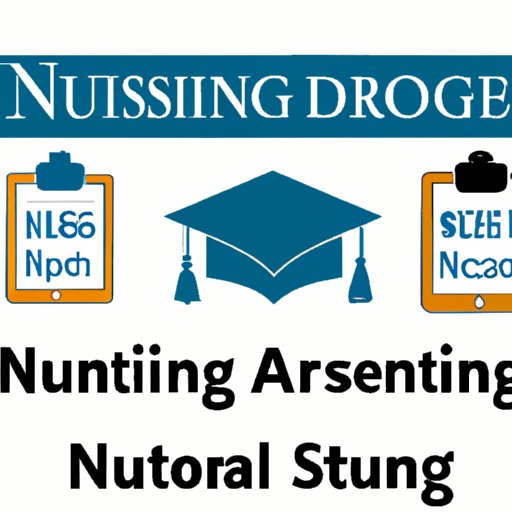
Introduction
Education is a crucial factor in pursuing a career in nursing. It provides individuals with the necessary knowledge, skills, and competencies to deliver quality patient care and make a positive impact on people’s lives. If you’re considering a career in nursing, this article will explore the various degrees you can pursue, from associate’s to master’s. We will also discuss the requirements for pursuing a nursing degree, the importance of practical training, and how continuing education can help you advance your career.
Breaking Down the Degrees: Understanding the Educational Pathways to Becoming a Nurse
There are three types of nursing degrees: associate’s, bachelor’s, and master’s. Associate’s degree programs take 2-3 years to complete and focus more on the hands-on elements of nursing rather than research and theory. Bachelor’s degree programs take four years to complete and provide students with a broader scope of knowledge, including the nursing theory and research that underpins the practice. Master’s degrees take 1-2 years of study beyond the bachelor’s level and prepare students for advanced nursing roles, such as nursing leadership or nurse practitioner.
The decision of which degree program to pursue depends on an individual’s career aspirations, financial resources, and time constraints. Associate’s degrees have a lower cost and take less time to complete, making them more accessible to entry-level nurses. Bachelor’s and master’s degrees offer greater flexibility and a wider variety of career opportunities, including advanced practice and nursing leadership positions. They also provide a deeper understanding of nursing science, which can help nurses make better decisions for their patients
The Pros and Cons of Pursuing a Nursing Degree Online
Online nursing programs offer an attractive option to students who are unable or unwilling to attend traditional nursing schools. They offer greater flexibility in terms of time and location, making it easier for individuals to manage their work and family commitments alongside their studies. They are also often cost-effective, as online students don’t have to spend money on transportation or accommodation.
However, there are also potential disadvantages to online nursing programs. These include a lack of face-to-face interaction with instructors and peers, limited access to practical training, and less focus on the human elements of nursing. Online students must also possess self-discipline and time-management skills to ensure they remain engaged and motivated throughout their studies.
When choosing an online nursing program, it’s essential to research and choose a reputable, accredited program. An online program that is not accredited may not meet the standards required for nursing licensure and could be a waste of time and money.
From High School to Nursing School: The Basic Requirements You’ll Need
At a minimum, aspiring RNs will need a high school diploma or equivalent to pursue a nursing degree. However, many nursing schools also require prerequisite coursework in math and science, such as biology and chemistry. Relevant work or volunteer experience in healthcare can also be beneficial, demonstrating an interest in and commitment to the field.
Preparing early for a nursing career is essential to increase the likelihood of acceptance into a nursing program. This involves taking challenging courses in high school, such as anatomy and physiology, and volunteering in healthcare facilities or shadowing nurses to gain practical exposure to the nursing profession.
Many prospective nursing students face obstacles, such as financial constraints or a lack of support or information. To overcome these challenges, it’s essential to research different nursing programs carefully, apply for scholarships and grants if necessary, and look for support from family, friends, or professional networks.
Beyond the Classroom: The Importance of Practical Training in Nursing School
While nursing programs provide students with essential knowledge and theoretical foundations, practical training is equally important. Clinical rotations, internships, simulations, and other forms of hands-on training are crucial in developing the skills and competencies that are necessary for a successful nursing career.
Exposure to various healthcare settings, patient populations, and medical conditions is an invaluable opportunity for nursing students to hone their critical thinking, communication, and interpersonal skills. It also provides a realistic introduction to the day-to-day responsibilities and challenges of working as a nurse.
To make the most of these practical training opportunities, it’s essential to stay engaged and proactive during clinical rotations and internships. Students should seek out feedback from clinical instructors, ask questions, and take advantage of every opportunity to learn.
The Ins and Outs of Nursing Certifications: How Continuing Education Helps You Advance Your Career
Nursing certifications demonstrate a nurse’s expertise and competence in a particular specialty or area of nursing practice. There are various types of certification available, such as the Certified Registered Nurse (CRN) licensure, specialty certifications, and advanced practice certifications.
Beyond the personal satisfaction of demonstrating expertise, nursing certifications offer multiple benefits to nurses, including career advancement, job security, and credibility in the field. They also help nurses stay up-to-date with new developments, technologies, and practices in nursing.
To prepare for and acquire nursing certifications, nurses must complete specific educational and experiential requirements, such as completing accredited continuing education courses. Finding mentors or professional networks can also be beneficial in providing ongoing support, encouragement, and opportunities for professional development.
Conclusion
In conclusion, a career in nursing requires a commitment to education, practical training, and lifelong learning. Aspiring nurses can choose between three different degree paths: associate, bachelor’s or master’s, depending on their career goals and individual circumstances. Regardless of the path chosen, the pursuit of a nursing degree requires academic preparation, practical training, and self-motivation.
By choosing a reputable nursing program, leveraging opportunities for practical training, and pursuing continuing education and certification, nurses can build rewarding and fulfilling careers in this essential and noble profession.




